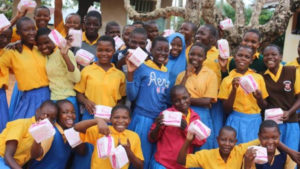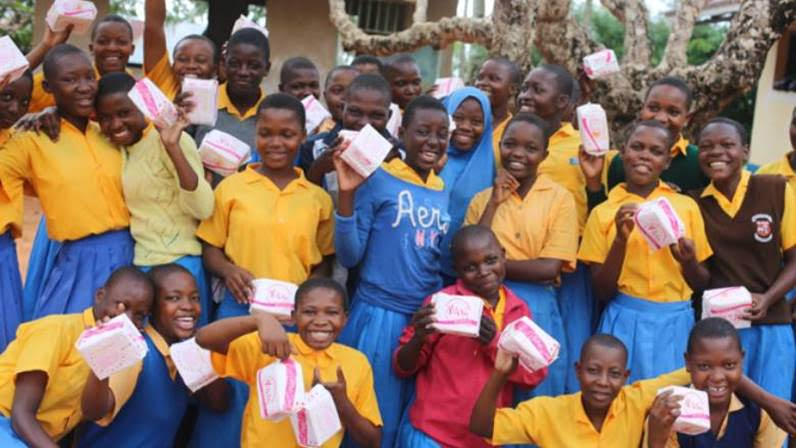
Credit: ZanaAfrica
Access to affordable and sustainable menstrual hygiene products (e.g. menstrual cloths, reusable pads, disposable pads, menstrual cups and tampons) is key to improving menstrual health and hygiene. Yet only a fraction of women and girls in developing countries use sanitary products during menstruation.
Individuals use specific menstrual hygiene products based on their availability (i.e. production), knowledge (i.e., awareness), income (i.e., affordability), and region (i.e., comfort level of use stemming from the cultural context).
Furthermore, affordability is a strong barrier to access menstrual products, particularly for poor women. In Kenya, 65% of the menstruators cannot afford menstrual products.
Even in the U.S., a survey of low-income women finds that nearly two-thirds couldn’t afford menstrual hygiene products such as tampons or pads during the previous year.
Creating a world where no woman or girl is kept from realizing her full potential because of her period is achievable. But it’s a complex undertaking that requires a wide range of stakeholders, expertise and collaboration, and a multi-level strategy. Studies show that menstrual products and education, held separately, are not enough.
A holistic approach – one that combines education with infrastructure, products, and efforts to tackle the societal taboos and stigma surrounding the issue — is most successful in achieving good menstrual health hygiene and improving development outcomes for women and adolescent girls. To this end, the private sector is playing a crucial role.
Megan Mukuria, founder and CEO of Kenya-based ZanaAfrica, which leverages reproductive health education and sanitary pads as a combined intervention to empower girls and women, says she once asked a young girl in Kenya how she would feel if she were given a year’s supply of sanitary pads. “She shyly put her hand over her face and whispered, ‘I would feel like the whole world loved me.’”
Ms. Mukuria founded ZanaAfrica after working with Kenyan street children and finding that not only were menstrual pads the second largest monthly cost for females, but also that adults did not share information with girls about puberty, “with devastating consequences.”
Through its non-profit programs, ZanaAfrica distributes Nia brand sanitary pads coupled with a proven health curriculum that is being scaled with support from the Kenyan Teacher Service Commission.
Through sales in commercial markets, they expand access to high quality, low-cost feminine hygiene products. All products feature unique packaging that provides reproductive health and rights information and free resources to women and girls.
“Product access itself creates new positive realities and amplifies outcomes in health, education and safety,” says Ms. Mukuria. “But our products do more than that. They connect a fragmented health and education system.
Customers connect however they want to (by WhatsApp, text or talking confidentially directly with a counsellor for free,) and find the answers and reproductive health services they need, whenever they need them.”
Similarly, in India, the hybrid social enterprise Aakar, comprising Aakar Innovations and Aakar Social Ventures, helps women produce and distribute affordable, high-quality sanitary napkins within their communities, while simultaneously raising awareness and sensitization of menstrual hygiene management.
Aakar’s sanitary pad, Anandi, is India’s first and only Government of India lab certified (ISO-17088) nearly 100% compostable and biodegradable sanitary pad. Anandi pads are available at an affordable price and provide women and girls in rural villages and urban areas access to a sustainable solution.
Last year, Aakar introduced Anandipads to the commercial market (Amazon, etc.), and a portion of those earnings is going back to villages by providing free/subsidized pads, along with menstrual hygiene education.
At the company, women are at the center of production. Anandi pads are manufactured in 30 operational “mini-factories” across India, Nepal, and eight African countries.
The factories are women-supervised and women-operated, facilitating jobs and the opportunity to learn entrepreneurial, marketing, and management skills.
“The training helped me understand more about menstruation and various hygiene practices, and what importance they have in our lives,” said Ramila Ben, 35, who works in Pipaliya District, Gujrat.
“I can now teach this to my daughters and other women in the village, as well. The financial and marketing concepts will help me invest my earnings more wisely, and I will be able to generate significant returns.”
According to Jaydeep Mandal, founder of Aakar Innovations, more than one million women and girls are consumers of Anandi pads and 400,000 have been reached through its education program.
Anandi mini-factories employ more than 700 women earning US$150 per month, and more than 500 women are engaged in selling pads within their villages, earning a seven to eight cent commission per package.
Sophia Grinvalds, AFRIpads’ co-founder and director, traveled to Uganda shortly after graduating, where she experienced firsthand the challenges women and girls face during their period. A year later, she and her husband launched the company.
To date, AFRIpads has reached over 3.5 million women and girls in more than 30 countries across Africa and the Middle East. In the AFRIpads factory in rural Uganda, 86% of the workers are women from marginalized backgrounds.
AFRIpads began solely as a reusable pad manufacturer, but they learned quickly that addressing menstrual health holistically meant going beyond the provision of menstrual products, says Grinvalds.
Today, in addition to manufacturing pads, they work directly with partners, including UN agencies and NGOs, to provide them with a range of additional resources, like an MHH Education Toolkit and a Data Collection Toolkit, distributed in four languages.
“We all have our role to play, and as interest in period poverty grows, we get smarter, bolder and more innovative as a sector,” says Grinvalds. “Our decade of work in menstrual health also shows that the power to drive sustainable change lies in collaboration.”
According to Thorsten Kiefer, co-founder of WASH United, the organization behind Menstrual Hygiene Day, the combination of business-thinking and focus on social impact that social entrepreneurs bring to the table has the potential to create disruptive new solutions and catalyze change.
“Menstrual Hygiene Day (MH Day), for instance, is based on an indirect impact model that focuses on leveraging the power of a movement of now close to 700 organizations, enabled by a central digital platform.
This model enables a team of under 10 people to coordinate a global campaign with a reach of more than 400 million people and a total campaign value of approximately US$60 million. We’re now starting to use the same model to provide free access to high quality solutions for period education for any organization or individual that wants to work on the issue.”
Enhancing opportunities for women and girls to access adequate menstrual health and hygiene is central to the World Bank Group achieving its development outcomes. Supporting a holistic approach can yield sustainable and lasting results. There are opportunities to involve the private sector and social entrepreneurs in pursuit of those goals.
For governments, fostering an enabling environment and creating stable conditions for small and medium-sized enterprises can facilitate growth. Actions could include helping entrepreneurs produce at a lower price, subsidies for mass scale production, support and subsidies for small and medium enterprises, or the integration of subsidies for menstrual products into existing conditional cash transfer programs. Improved quality standards in sanitary pad tenders, including referrable reproductive health resources on packs in tenders, would improve the ability of girls to manage their full period with dignity and more safely navigate adolescence. Regulatory activity that encourages business to employ women would also benefit the community and the enterprises.


